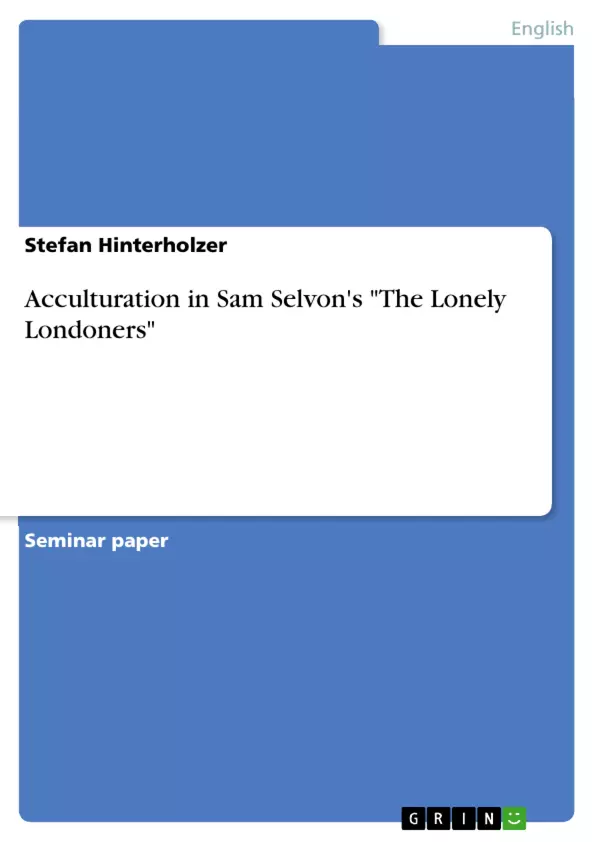Acculturation is a phenomenon whose importance is more and more increasing due to our modern society that is becoming more mobile and the world becoming more and more a place in which people move either freely or forced (refugees, emigrants looking for a better place to live etc.). Of course, there are certain obstacles that make this process of mobility more difficult. People from one culture leave their roots and start a new life in a new culture. As a consequence, they are forced to adapt to and to adopt this new culture to a certain extent. This is a very complex progress that is described by cultural studies.
Just like any other experience, acculturation can be dealt with in literature. Literature can serve as a mirror that reflects cultural phenomena, human experiences, events in history etc. Literary studies deal with the interpretation of these depictions (or reflections) in literary works.
Since literary and cultural studies can partly deal with the same topics, there are interfaces. The focus of this research paper will be on acculturation theories and their application to Sam Selvon’s The Lonely Londoners with a further focus on the historical background that is intended to provide a better understanding of the acculturation process Selvon’s characters make through. It will also be analyzed how Selvon depicts his characters in their acculturation process, whether he uses stereotypes or a differentiated depiction and which problems the characters have to face. It will be shown in how far literature can reflect cultural phenomena and in how far this could be achieved in The Lonely Londoners.
Inhaltsverzeichnis (Table of Contents)
- Acculturation - Interfaces between Cultural and Literary Studies
- Terminology
- Historical background
- The Acculturation Process
- Contact and participation
- Language
- Wage Employment
- Daily practice
- Age
- Acculturation Attitude
- Assimilation
- Integration
- Marginalization
- Separation
- Acculturative Stress – Identity Confusion
- Acculturation - Fiction and Reality
- Bibliography
Zielsetzung und Themenschwerpunkte (Objectives and Key Themes)
This research paper explores the concept of acculturation through the lens of Sam Selvon's novel "The Lonely Londoners". The paper aims to examine the theories of acculturation and their application to the lives of West Indian immigrants in post-war Britain, specifically focusing on the historical context that informs their acculturation process. The paper further investigates Selvon's portrayal of the characters in their acculturation process, evaluating whether he utilizes stereotypes or offers a more nuanced representation, and analyzing the challenges his characters face in adapting to their new environment. Ultimately, the paper aims to demonstrate the potential of literature to reflect cultural phenomena and how this is achieved in "The Lonely Londoners".
- Acculturation and its relationship to cultural and literary studies
- The historical context of West Indian immigration to Britain
- The acculturation process experienced by West Indian immigrants in Britain
- The portrayal of acculturation in literature, specifically in "The Lonely Londoners"
- The relationship between culture and literature
Zusammenfassung der Kapitel (Chapter Summaries)
The paper begins by establishing the connection between acculturation and the fields of cultural and literary studies. It explores how acculturation, as a phenomenon characterized by cultural change, is reflected and analyzed in literary works.
Chapter 2 introduces the key terms – “culture” and “acculturation” – and their significance in understanding the context of the study. The chapter clarifies the interrelationship between culture and literature, recognizing that literature both influences and is influenced by cultural phenomena. The definition of acculturation is explored with a focus on the individual experiences of acculturation, which aligns with the analysis of Selvon's novel.
Chapter 3 provides a historical background of West Indian immigration to Britain, focusing on the post-World War II period. The chapter examines the reasons behind the wave of immigration, including the recruitment of West Indians during the war, the subsequent economic and social conditions in the Caribbean, and the “open door policy” of Britain. The chapter discusses the motivations of the immigrants, highlighting the expectations of better opportunities and the role of family reunification in driving the immigration process.
Chapter 4 delves into the broader concept of acculturation, exploring the process of adaptation to a new culture. It analyzes the various challenges and experiences faced by immigrants, including language barriers, employment opportunities, social practices, and generational differences.
Chapter 5 further examines the different attitudes towards acculturation, focusing on four key approaches: assimilation, integration, marginalization, and separation. Each approach is defined and explored, providing a framework for understanding the various ways in which individuals navigate the process of acculturation.
Chapter 6 discusses the potential stress associated with the acculturation process, specifically exploring the concept of "acculturative stress" and its impact on identity formation.
Chapter 7 moves beyond the theoretical exploration of acculturation and explores the relationship between fictional accounts of acculturation and the lived reality of immigrant experiences.
Schlüsselwörter (Keywords)
The primary keywords and focus topics of this paper include: acculturation, cultural studies, literary studies, West Indian immigration, post-war Britain, "The Lonely Londoners", Sam Selvon, assimilation, integration, marginalization, separation, acculturative stress, identity confusion, and the relationship between literature and culture.
- Quote paper
- Stefan Hinterholzer (Author), 2006, Acculturation in Sam Selvon's "The Lonely Londoners", Munich, GRIN Verlag, https://www.grin.com/document/65854



